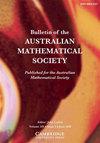MONOGENIC EVEN QUARTIC TRINOMIALS
IF 0.5
4区 数学
Q3 MATHEMATICS
引用次数: 0
Abstract
A monic polynomial  $f(x)\in {\mathbb Z}[x]$ of degree N is called monogenic if
$f(x)\in {\mathbb Z}[x]$ of degree N is called monogenic if  $f(x)$ is irreducible over
$f(x)$ is irreducible over  ${\mathbb Q}$ and
${\mathbb Q}$ and  $\{1,\theta ,\theta ^2,\ldots ,\theta ^{N-1}\}$ is a basis for the ring of integers of
$\{1,\theta ,\theta ^2,\ldots ,\theta ^{N-1}\}$ is a basis for the ring of integers of  ${\mathbb Q}(\theta )$, where
${\mathbb Q}(\theta )$, where  $f(\theta )=0$. We prove that there exist exactly three distinct monogenic trinomials of the form
$f(\theta )=0$. We prove that there exist exactly three distinct monogenic trinomials of the form  $x^4+bx^2+d$ whose Galois group is the cyclic group of order 4. We also show that the situation is quite different when the Galois group is not cyclic.
$x^4+bx^2+d$ whose Galois group is the cyclic group of order 4. We also show that the situation is quite different when the Galois group is not cyclic.
单向偶四次方三项式
如果 $f(x)$ 在 ${\mathbb Q}$ 上是不可约的,并且 ${1、\theta ,\theta ^2,\ldots ,\theta ^{N-1}\}$ 是 ${\mathbb Q}(\theta )$ 的整数环的基,其中 $f(\theta )=0$.我们证明恰好存在三个不同的形式为 $x^4+bx^2+d$ 的单元三项式,它们的伽罗瓦群是阶数为 4 的循环群。我们还证明了当伽罗瓦群不是循环群时,情况会截然不同。
本文章由计算机程序翻译,如有差异,请以英文原文为准。
求助全文
约1分钟内获得全文
求助全文
来源期刊
CiteScore
1.20
自引率
14.30%
发文量
149
审稿时长
4-8 weeks
期刊介绍:
Bulletin of the Australian Mathematical Society aims at quick publication of original research in all branches of mathematics. Papers are accepted only after peer review but editorial decisions on acceptance or otherwise are taken quickly, normally within a month of receipt of the paper. The Bulletin concentrates on presenting new and interesting results in a clear and attractive way.
Published Bi-monthly
Published for the Australian Mathematical Society

 求助内容:
求助内容: 应助结果提醒方式:
应助结果提醒方式:


